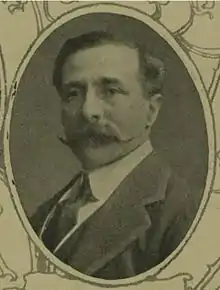| Wolverhampton South | |
|---|---|
| Former Borough constituency for the House of Commons | |
| 1885–1918 | |
| Seats | one |
| Created from | Wolverhampton |
| Replaced by | Bilston |
Wolverhampton South was a parliamentary constituency in the town of Wolverhampton in the West Midlands of England. It returned one Member of Parliament to the House of Commons of the Parliament of the United Kingdom.
History
The constituency was created by the Redistribution of Seats Act 1885 for the 1885 general election, when the former two-seat Wolverhampton constituency was divided into three single-member constituencies.
It was abolished for the 1918 general election.
Boundaries
The civil parish of Bilston, and part of the civil parish of Sedgley.
Members of Parliament
| Year | Member | Party | |
|---|---|---|---|
| 1885 | Charles Pelham Villiers | Liberal | |
| 1886 | Liberal Unionist | ||
| 1898 | John Lloyd Gibbons | Liberal Unionist | |
| 1900 | Henry Norman | Liberal | |
| 1910 | T. E. Hickman | Conservative | |
| 1918 | constituency abolished | ||
Elections
Elections in the 1880s
| Party | Candidate | Votes | % | ±% | |
|---|---|---|---|---|---|
| Liberal | Charles Villiers | Unopposed | |||
| Liberal win (new seat) | |||||
| Party | Candidate | Votes | % | ±% | |
|---|---|---|---|---|---|
| Liberal Unionist | Charles Villiers | Unopposed | |||
| Liberal Unionist gain from Liberal | |||||
Elections in the 1890s
| Party | Candidate | Votes | % | ±% | |
|---|---|---|---|---|---|
| Liberal Unionist | Charles Villiers | Unopposed | |||
| Liberal Unionist hold | |||||
| Party | Candidate | Votes | % | ±% | |
|---|---|---|---|---|---|
| Liberal Unionist | Charles Villiers | Unopposed | |||
| Liberal Unionist hold | |||||
Villiers' death caused a by-election.

George Thorne
| Party | Candidate | Votes | % | ±% | |
|---|---|---|---|---|---|
| Liberal Unionist | John Lloyd Gibbons | 4,115 | 50.7 | N/A | |
| Liberal | George Rennie Thorne | 4,004 | 49.3 | New | |
| Majority | 111 | 1.4 | N/A | ||
| Turnout | 8,119 | 88.3 | N/A | ||
| Registered electors | 9,194 | ||||
| Liberal Unionist hold | Swing | N/A | |||
Elections in the 1900s

Henry Norman
| Party | Candidate | Votes | % | ±% | |
|---|---|---|---|---|---|
| Liberal | Henry Norman | 3,701 | 51.2 | N/A | |
| Liberal Unionist | W Oulton | 3,532 | 48.8 | N/A | |
| Majority | 169 | 2.4 | N/A | ||
| Turnout | 7,233 | 76.8 | N/A | ||
| Registered electors | 9,414 | ||||
| Liberal gain from Liberal Unionist | Swing | N/A | |||
| Party | Candidate | Votes | % | ±% | |
|---|---|---|---|---|---|
| Liberal | Henry Norman | 4,823 | 53.8 | +2.6 | |
| Liberal Unionist | Charles Hyde Villiers (soldier) | 4,137 | 46.2 | −2.6 | |
| Majority | 686 | 7.6 | +5.2 | ||
| Turnout | 8,960 | 89.8 | +13.0 | ||
| Registered electors | 9,974 | ||||
| Liberal hold | Swing | +2.6 | |||
Elections in the 1910s
| Party | Candidate | Votes | % | ±% | |
|---|---|---|---|---|---|
| Conservative | T. E. Hickman | 4,989 | 51.9 | +5.7 | |
| Liberal | Henry Norman | 4,619 | 48.1 | −5.7 | |
| Majority | 370 | 3.8 | N/A | ||
| Turnout | 9,608 | 93.7 | +3.9 | ||
| Registered electors | 10,253 | ||||
| Conservative gain from Liberal | Swing | N/A | |||

Arthur Lever
| Party | Candidate | Votes | % | ±% | |
|---|---|---|---|---|---|
| Conservative | T. E. Hickman | 4,784 | 51.9 | 0.0 | |
| Liberal | Arthur Lever | 4,440 | 48.1 | 0.0 | |
| Majority | 344 | 3.8 | 0.0 | ||
| Turnout | 9,224 | 90.0 | −3.7 | ||
| Registered electors | 10,253 | ||||
| Conservative hold | Swing | 0.0 | |||
See also
References
This article is issued from Wikipedia. The text is licensed under Creative Commons - Attribution - Sharealike. Additional terms may apply for the media files.